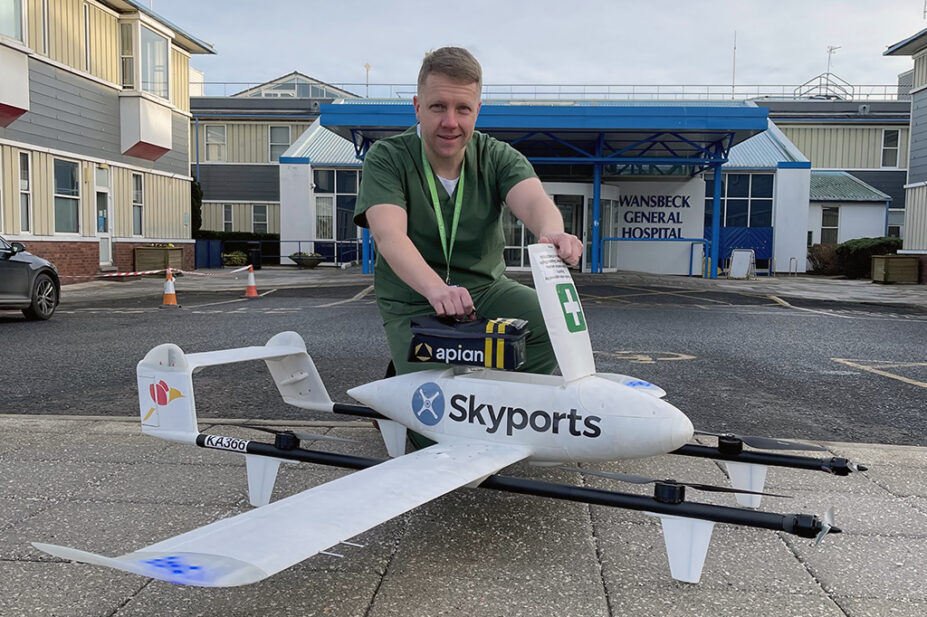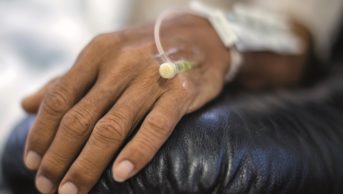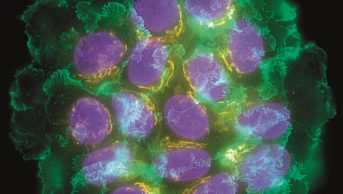
Northumbria Healthcare NHS Foundation Trust
An NHS trust in Northumbria has become the second hospital to trial the use of drones to transport chemotherapy medicines between sites.
The drones, operated by the company Apian, will carry chemotherapy medicines from Wansbeck General Hospital in Ashington to Alnwick Infirmary and Berwick Infirmary, and transport blood samples back to Wansbeck for testing.
In July 2022, patients with cancer at St Mary’s Hospital on the Isle of Wight became the first in the world to receive chemotheraphy delivered by drone, from Portsmouth Hospitals University NHS Trust.
In the same month, Apian also operated test flights between Portsmouth and the Isle of Wight carrying prescriptions for Boots pharmacies, making it the first community pharmacy in the UK to transport prescription-only medicines by drone.
On 2 March 2023, Christopher Law, medical director at Apian, told The Pharmaceutical Journal that the use of drones will save travel time for patients in Northumbria and reduce waste of the chemotherapy drugs, which are made in the pharmacy production unit at Wansbeck General Hospital.
“Currently, they have fixed intervals for deliveries and if [patients] miss the cut-off points, they have to wait another half a day at least, to get the next scheduled delivery [of chemotherapy],” he said.
“Everything is done way ahead of time on delivering the products before the patient even arrives and if the patient isn’t fit enough on the day after their clinical assessment, then [the medicine] gets wasted, and these are really expensive chemotherapy.”
Law added that when patients come to the hospital for a blood test, it “takes a day or so — if not more — to get their results turned around … and if they are positive, then they would be brought back in and have the treatment on the following day”.
“But with drones there is absolutely a case where patients could come in in the morning, have a blood test taken, delivered, have the clinician review it, and then even have the pharmacy products manufactured and delivered on the same day,” he explained.
“Not only does it improve patient experience, but also the reduction in carbon emissions as well.”
The trial, which is running from 13 February to 12 May 2023, will collect logistical data, including temperature readings, to ensure the drones can safely transport the medicines.
However, Law said the drones will begin transporting chemotherapy in the next three or four weeks and will be able to transport up to three syringes at a time.
In a statement published on 13 February 2023, Northumbria Healthcare NHS Foundation Trust said there will be 15 flights per day by the end of the trial, delivering “prescriptions, medical equipment and mail” in addition to chemotherapy and pathology samples.
Sir James Mackey, chief executive of Northumbria Healthcare NHS Foundation Trust, said: “With the area we cover and the number of hospitals and other sites we manage, having effective logistics to get supplies where they need to be is vital, while we are always mindful of our need to drive efficiencies and reduce our impact on the environment.
“Using drones has the potential to help us deliver important drugs and supplies in a better, smarter way, so we are looking forward to seeing how the test flights go. We are committed to providing as much care as we can in our outlying communities, so logistical routes to Alnwick and Berwick are a key focus.”
NHS Scotland received £10m in July 2022 to develop a national drone medicine delivery service, connecting hospitals, laboratories, GP surgeries and distribution centres.

